Learning about slightly more advanced networking with linux
Paul Warren
Mastodon: @pwarren@mastodon.thewarrens.name
email: paul at thewarrens.name
© 2021 Paul Warren
CC BY-NC-SA
! WARNING !
I am not a network engineer, there are gaps in my knowledge
The words I use might not be the correct ones
Please don't blame me if your network stops networking
Maybe don't go and try building an ISP based off this talk :)
What even is a network?
Ethernet?
Token Ring?
IPX?
AX.25?
What even is a network?
ipv4?
ipv6?
tcp?
Allows connections between computers
Managed networks
Controls connections between computers
Scales connections between computers
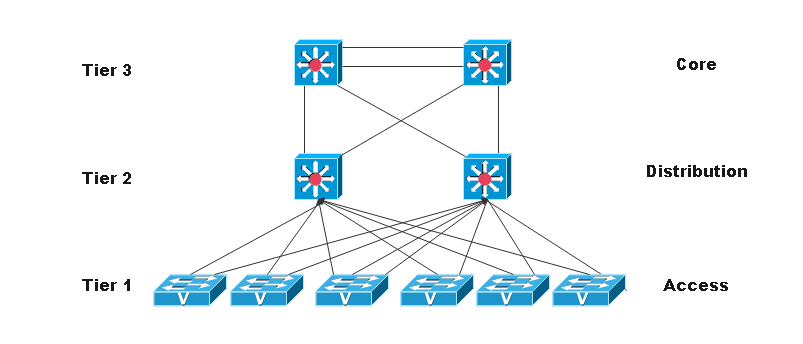
Layers!
Like an onion!
That 7 layer thing from the OSI
Ethernet -> IP -> ICMP/TCP/UDP
Administrative overlays
VPNs and Tunnels
Layers
This means the Physical layers do not have to match the Logical connections
Networks are also a bit fractal in nature
For the purposes of this talk, we can ignore a lot of complexity
An easy one!
VLANS
Ethernet layer
Designed to limit broadcast storms
Can also separate IP networks on the same Ethernet
Tagged and Untagged/Default
IEEE 802.1Q
VLANs in linux
Are pretty easy!
ip link add link enp0s2 name enp0s2.2501 vlan id 2501
ip -6 addr add 2001:db8:2501::10/64 dev enp0s2.2501
ip link set dev enp0s2.2501 up
VLANs in linux
Various different methods of making it go in different distributions
Debian: in /etc/network/interfaces
auto enp1s0.2502
iface enp1s0.2502 inet dhcp
iface enp1s0.2502 inet6 auto
OpenWRT has a nice GUI
VLANs in linux
Here's what I've done
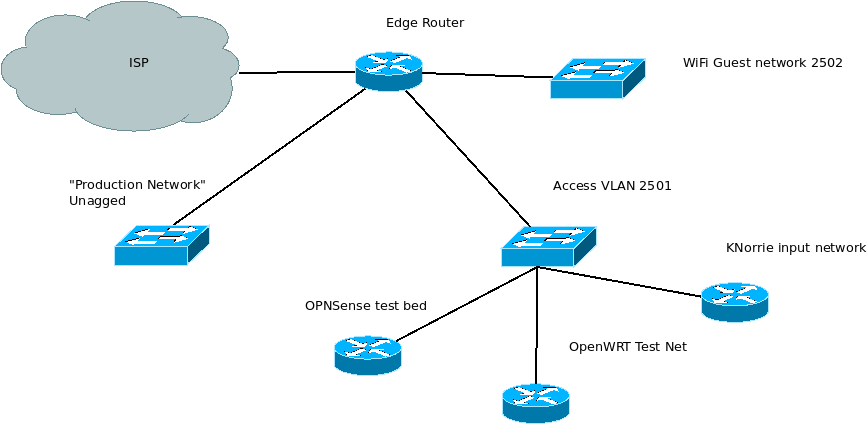
What even is a router?
Two or more interfaces
Some logic to determine where a packet goes
Linux Routing
Add to sysctl config:
net.ipv4.ip_forward = 1
net.ipv6.conf.all.forwarding = 1
net.ipv6.conf.default.forwarding = 1
And we're done!
Yeah, not really :)
Static Routes
Manually added, or scripted routes that don't change
ip route add 172.17.0.0/24 via 172.16.0.254 dev wg0
Static Routes
ip -6 route add 2001:db8:2501::/64 via 2001:db8:2500::1 dev enp0s1
ip -6 route add 2001:db8:2502::/64 via 2001:db8:2500::1 dev enp0s1
ip -6 route add 2001:db8:2600:beef:/64 via 2001:db8:face::1 dev wg0
Static Routes
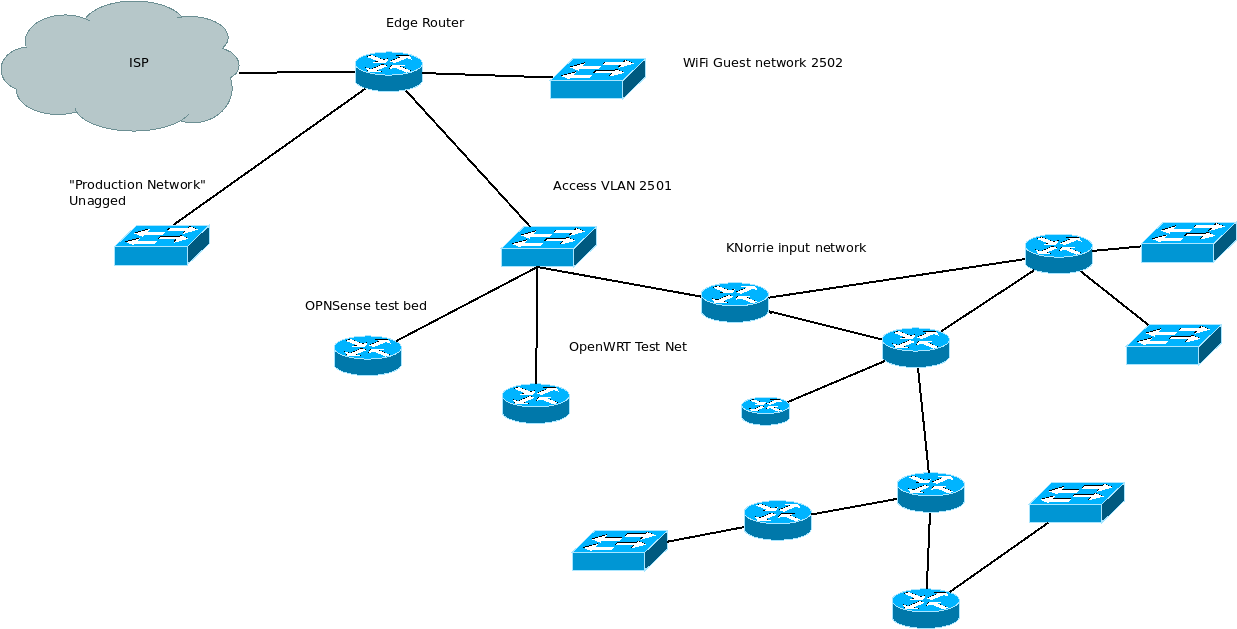
Enter dynamic routes
Advertise your LANs
Discovering routes to other LANs
Optional: Do some logic
Add them to the routing table
Userspace daemons
talking to the kernel networking stack
Dynamic Routing
Open Shortest Path First (OSPF)
Uses Dijkstra's algorithm
RFC2328
RFC5340
For: Dynamic routes inside your networks
Dynamic Routing
Border Gateway Protocol (BGP)
RF4271
For: Sharing dynamic routes outside your network with other Autonomous Sytstems (AS)
"AS" is used a lot in the ISP world, and your ISP will have an assigned AS Number
The Userspace Daemons
BIRD: Berkeley Internet Routing Daemon
Quagga: Fork of Zebra
OpenBGPd/OpenOSPFd: from the OpenBSD project
Significant overlap, but they are different
I've not used Quagga, or the OpenBSD ones
There are probably others!
intro to bird
Powerful
Complex to configure
Use version control
Intro to bird configuration
/etc/bird.conf
router id 10.9.99.6;
log "/var/log/bird/bird.log" all;
debug protocols { states, routes, filters, interfaces }
protocol kernel {
import none;
export all;
}
protocol device {
# defaults...
}
Intro to bird configuration
/etc/bird.conf
Each router needs a unique ID
Protocol blocks, There are lots of types
They are how bird knows what to talk to and how
Intro to bird configuration
protocol ospf {
area 0 {
interface "lo" {
stub;
};
interface "vlan1001" {
};
interface "vlan1034" {
stub;
};
};
}
There are a lot more options than stub or default
BIRD documentation is really good
Intro to bird configuration
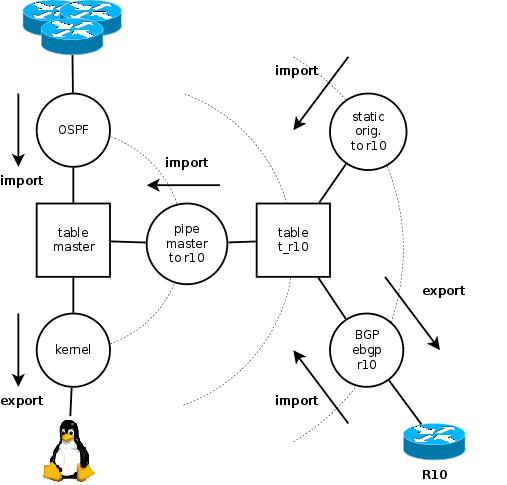
Import vs Export
Master Table
Logic in Pipes
A funky thing you can do with OSPF
A necessary service
Contained within a network
Data more efficiently obtained across local links
Can still get the costly versions if local goes down
A funky thing you can do with OSPF
An IP for a host that provides that service
Can use that same IP in two different places in the network
Confused routing?
OSPF to the rescue!
A funky thing you can do with OSPF
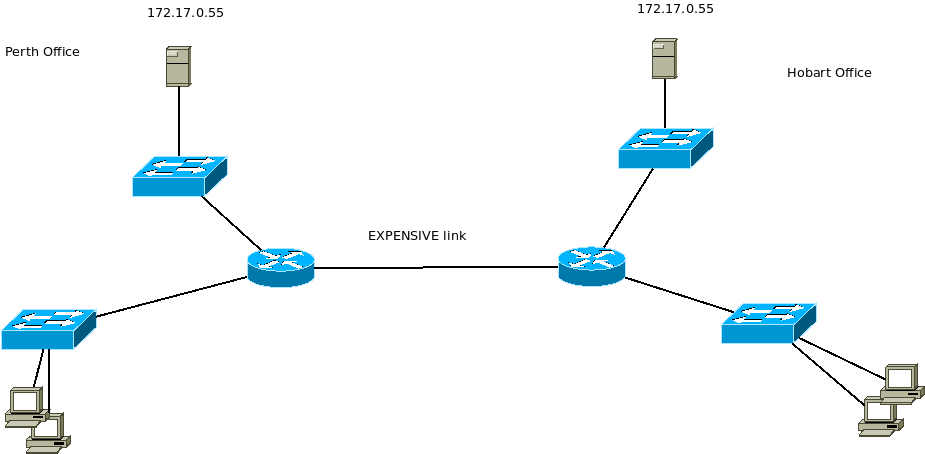
Why use a 'real' router
Linux based router:
NIC Hardware
-> whole packet to Driver memory
-> various kernel subsystems
Routing decision made
Then back out the same path
Why use a 'real' router
Enterprise level router
NIC Hardware
Just Enough Packet to get the address
-> routing silicon
Routing decision made
Silicon switched to forward packet out correct NIC Hardware
Why use a 'real' router
Performance
Some work being done on 'zero copy' networking in linux
io_uring also has some smarts for this
Why use a 'real' router
Other Considerations
Network Engineers are
Not familiar with linux networking
will have significant skills using commercial routing software
Hardware ruggedness, suitability for datacentre
power consumption
¿Por qué no los dos?
OpenWRT is a linux based distribution for real networking hardware
BGP
Sorry, didn't get to explore this as much as I'd like
Not too confident talking about it as yet
Is how the internet is put together
Bonus homework
Why did I use 2001::db8::/32?
Why did I use /64s?
I highly recommend going through KNorrie's network examples: https://github.com/knorrie/network-examples
OSPF Areas
Auth* for OSPF
Automatic transfers of internal aggregate networks to BGP (Something I've not investigated much)
Resources
These slides: https://gitea.pwarren.id.au/pwarren/SysAdmin2022
bird: https://bird.network.cz
Openwrt: https://openwrt.org/
The OpenWRT IRC channel, currently on the OFTC network
BenEater's "Why was facebook down for five hours"